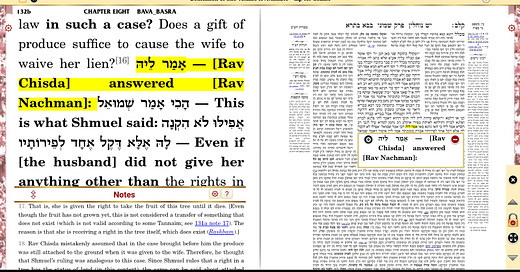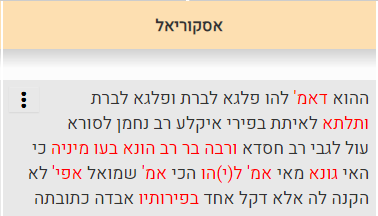Would Rav Chisda Quote Shmuel to Rav Nachman?!
The other day, I strongly disagreed with how Rav Steinsaltz translated reshut as permission, siding with Artscroll which took it as authority. To balance it out , here’s where I side mostly with Rav Steinsaltz’s rendering over that of Artscroll.
On Bava Batra 132b, the following exchange between Rav Nachman and Rav Chsda:
הַהוּא דַּאֲמַר לְהוּ: ״פַּלְגָא לִבְרַת, וּפַלְגָא לִבְרַת, וְתִילְתָּא לְאִיתַּת בְּפֵירֵי״. אִיקְּלַע רַב נַחְמָן לְסוּרָא, עוּל לְגַבֵּי רַב חִסְדָּא, אֲמַר לֵיהּ: כִּי הַאי גַוְונָא מַאי? אֲמַר לֵיהּ, הָכִי אָמַר שְׁמוּאֵל: אֲפִילּוּ לֹא הִקְנָה לָהּ אֶלָּא דֶּקֶל אֶחָד לְפֵירוֹתָיו – אִבְּדָה כְּתוּבָּתָהּ.
§ There was a certain man on his deathbed who said to the people surrounding him: Give one-half of my estate to my daughter, and one-half to my other daughter, and one-third of the produce to my wife. Rav Naḥman happened to come to Sura. He entered the study hall to see Rav Ḥisda, who said to him: In a case like this, what is the halakha? Rav Naḥman said to him that this is what Shmuel says: Even if he transferred to her ownership only one palm tree for its produce, she has lost her right to receive payment of her marriage contract.
אֲמַר לֵיהּ: אֵימוֹר דְּאָמַר שְׁמוּאֵל הָתָם – דְּאַקְנִי לַהּ בְּגוּפַהּ דְּאַרְעָא; הָכָא – פֵּירָא הוּא! אֲמַר לֵיהּ: מִטַּלְטְלִי קָא אָמְרַתְּ? מִטַּלְטְלִי וַדַּאי לָא קָא אָמֵינָא.
Rav Ḥisda said to him: Say that Shmuel said his statement that she loses her right there, in a case where he gave her a palm tree for its produce, because he transferred rights in the land itself to her ownership, as the palm tree is connected to the ground. But here, in this case, it is only produce that he gave her, without any share in the land itself. Perhaps she does not lose payment of her marriage contract. Rav Naḥman said to him: You say that he gave her only movable property? I certainly did not mean to say that she loses her right even if he gave her only movable property such as produce. Rather, she receives payment of her marriage contract.
No names of speaker and listener are given throughout, just amar leih, so we need to figure out who is the initial speaker and then keep flipping back and forth. Rav Steinsaltz tagged Rav Chisda as the questioner. Thus, “Rav Ḥisda, who said to him”, from עוּל לְגַבֵּי רַב חִסְדָּא, אֲמַר לֵיהּ. And so, it is Rav Nachman who says
Artscroll has the reverse:
As you can see, Rav Nachman has asked the question, and now, Rav Chisda answers him with הָכִי אָמַר שְׁמוּאֵל, so said Shmuel.
I would side with Rav Steinsaltz’s disambiguation of pronouns for a few reasons.
My general sense is, in the absence of Rav Huna (who presumably passed away before this story happened), Rav Chisda would be kafuf, more subservient, to Rav Nachman, rather than vice versa. Just from other stories, and their relationship with “Huna”.
Rav Nachman is associated with Nehardea academy while Rav Chisda with Sura academy, along with Rav Huna. Shmuel is more of a Nehardea figure. I don’t expect that Rav Nachman would travel to Sura to find out something that his (direct or perhaps indirect) teacher Shmuel said. The reverse makes a lot more sense, that Rav Chisda asks Rav Nachman, who replies by quoting his own teacher.
Read on about the girsaot which makes it even clearer.
A large part of the ambiguity is that leih is the singular, “to him”. If one were singular and the other were plural, lehu, that would entirely eliminate the ambiguity. And guess what — two manuscripts make the Suran side of this story into two people.
Thus, Munich 95, Escorial, and Vatican 115 make it Rabba bar Rav Huna and Rav Chisda:
Indeed, here is a manuscript image from Vatican 115b:
which, strictly speaking, has Rav Chisda and Rabba bar bar Chana, but that is an obvious error.
After Rav Huna died, his son, Rabbi bar Rav Huna, took over leadership of Sura academy, with assistance from his father’s student-colleague, Rav Chisda, in a secondary role. When Rav Nachman arrived, they took the opportunity to present this case to him. And then, we have amar lehu when Rav Nachman responds to these two Amoraim that “Shmuel said thusly”. And then א”ל or אמ׳ ליה is when they respond to him, as amru leih.








